
Related
Guests
- Tariq AliBritish-Pakistani political commentator, writer, activist, and editor of the New Left Review. Author of numerous books, including The Obama Syndrome: Surrender at Home, War Abroad.
The European Union was awarded the Nobel Peace Prize earlier today for its historic role in uniting the continent. Committee chair Thorbjoern Jagland praised the EU for transforming Europe “from a continent of wars to a continent of peace.” The selection surprised many as it comes at a time when much of Europe is facing an economic crisis that threatens the EU’s future. Just this past week, thousands of Greeks protested in Athens against a visit by German Chancellor Angela Merkel, who has pushed Greece, Spain and Ireland to enact deep austerity measures. For more, we go to London to speak with Tariq Ali, political commentator, historian, activist and editor of the New Left Review. “My initial response was to burst out laughing, because this Nobel Peace Prize committee, basically run by clapped-out former politicians in Norway, never fails to amuse and disappoint,” Ali says. “To give the prize to the European Community at a time, effectively, when economically it is promoting unemployment, creating real class divides in virtually every country in Europe, where it has led to enormous violence on the streets of Greece, because of the policies being pushed by the EU … it’s a complete and utter joke.” [includes rush transcript]
Transcript
AMY GOODMAN: We’re on the road in Albuquerque, New Mexico, on our 100-city tour. Check our website at tour.democracynow.org.
We begin today’s show with the selection of the European Union for winning the Nobel Peace Prize for its historic role in uniting the continent. Committee chair Thorbjoern Jagland praised the EU for transforming Europe “from a continent of wars to a continent of peace.”
The selection of the European Union surprised many, as it comes at a time when much of Europe is facing an economic crisis that threatens the EU’s future. Just this past week, thousands of Greeks protested in Athens against a visit by the German chancellor, Angela Merkel, who has pushed Greece, Spain and Ireland to enact deep austerity measures.
For more on this year’s Nobel Peace Prize, we go to London, where we’re joined by Tariq Ali, political commentator, historian, activist and editor of the New Left Review. He is the author of over 20 books, including The Duel: Pakistan on the Flight Path of American Power. He joins us by Democracy Now! video stream.
Welcome to Democracy Now!, Tariq.
TARIQ ALI: Hi, Amy.
AMY GOODMAN: When you got up this morning and heard the news that the Nobel Prize committee has honored the European Union, given it the Nobel Peace Prize this year, your response?
TARIQ ALI: My initial response, Amy, was to burst out laughing, because this Nobel Peace Prize committee, basically run by clapped-out former politicians in Norway, never fails to amuse and disappoint. I mean, they constantly behave like this. Their prize choices over the last 20 years have been laughable, in some cases monstrous.
To give the prize to the European Community at a time, effectively, when economically it is promoting unemployment, creating real class divides in virtually every country in Europe, where it has led to enormous violence on the streets of Greece, because of the policies being pushed by the EU—democratically, there’s a huge deficit. The vote cast in the whole of Europe, member of the EU, has gone down 40 percent over the last 20 years. I mean, about 43 percent of the people vote. And in fewer numbers, the young barely bother to vote at all. The constitution was rammed through at a time, several years ago, when not even the politicians who signed it had read it. And the third policy of the EU, which is not talked about much, that it is now almost a duty of every country joining the EU to automatically become part of NATO. So giving the EU the prize is also rewarding NATO. And it’s worth remembering that virtually every major EU country has troops in Afghanistan. Every major EU country has supported and ratified the occupation of Iraq, even though some opposed the war.
So it’s a complete and utter joke, especially at this time, when there’s complete turmoil on the streets of southern Europe. And it just shows that these Norwegian former politicians who comprise the committee are completely out of touch. And I’m sure there will be anger in Norway itself, as there usually is when they announce the peace prize.
AMY GOODMAN: The Norwegian Peace Council has called for the resignation of the head of the Nobel Committee after it awarded the peace prize to the European Union. The Norwegian Peace Council said, “Granting the EU the Nobel Peace Prize for 2012 indicates its highly political dimension, awarding it to a project that for the past year has proven to represent the opposite of peace. The EU suffers from an extensive democratic deficit, with violations of human rights along increasing social inequality.” That statement from the Norwegian Peace Council, Tariq Ali.
TARIQ ALI: Amy, the Norwegian Peace Council has criticized the peace prize in the past. In fact, Alfred Nobel specified that the peace prize should only be given to those who are actively promoting the cause of peace, which the EU doesn’t do, either in the Middle East—for instance, it has backed and supported everything the Israelis have done as far as the occupation of Palestine is concerned. It has tried to isolate the elected Palestinian government in the past. It has carried on supporting NATO—and it’s part of it—and the war in Afghanistan. So, it’s—the question is, is the Nobel Prize committee on a suicide [inaudible], because this decision will not be popular even amongst many, many Swedish—Norwegian members of parliament. I was there a few years ago when they gave it to Obama, and about 10,000 people demonstrated against that, because Obama had just said he was going to escalate the war in Afghanistan and Pakistan.
So, the peace committee itself now, the Nobel Prize committee, has become a version of the EU. It’s undemocratic. It’s self-appointed. There’s no accountability whatsoever. And something needs to be done to change it. In the case of the prize committee, it should be internationalized. It can’t just be these deadbeat politicians.
AMY GOODMAN: Panos Skourletis, the spokesperson for Greece’s main opposition party, Syriza, said, “I just cannot understand what the reasoning would be behind it. In many parts of Europe, but especially in Greece, we are experiencing what really is a war situation on a daily basis, albeit a war that has not been formally declared. There is nothing peaceful about it,” he said. Tariq?
TARIQ ALI: Well, Greece is, of course, a classic case in point, Amy, because not only have they created a situation by their demands, the German banks, in particular, backed by the French banks and the politicians who defend the system, they’ve made the life of virtually every Greek, right up to the middle classes, barring the very rich—which is miserable. I’ve been to Greece often over the last year and a half, and the situation is really bad now. And more to the point, that when there was a chance that the Syriza leader, Alexis Tsipras, might be elected—they came very close to it—every EU politician, including the recently elected François Hollande of France, went on Greek television and appealed to the Greek people that “if you vote for Syriza, you will be crushed. This is a suicidal thing. Greece will be destroyed.” These threats worked, and the elderly, in particular, didn’t vote for Syriza, but the young did. And so, this open intervention, anti-democratic, in the elections of a Greek—of a European Union country had a very negative impact.
The question is, Amy, why did this committee behave like this? And it’s because it’s totally out of touch. It doesn’t care. It feels it can be part of the prize committee forever. They nominate each other. And I think this time, though we’ve said this before, they’ve gone too far, and people will be very angry.
AMY GOODMAN: European Commission President Barroso praised the Nobel Committee’s decision. This is what he said.
JOSÉ MANUEL BARROSO: We must never forget that, at its origins, the European Union brought together nations emerging from the ruins of the devastating Second World War and united them in a project for peace built on supranational institutions representing the common European interest. The European Union, then European Community, has reunified countries split by the Cold War and has made it around the values of respect for human dignity, freedom, democracy, justice, the rule of law and respect for human rights.
AMY GOODMAN: That was the European Commission president, Tariq Ali.
TARIQ ALI: Amy, Barroso was a leader of Portugal during the Iraq war and decided to back the war, against the wishes of a majority of the Portuguese people. For him to stand up and talk about defending human rights, when he participated in a war which led to the death of over a million people, is just outrageous. Not only outside the European Union, inside the European Union, Barroso, as well as the other leaders of the EU, have sanctioned new laws which have suspended habeas corpus, which have limited civil rights and human rights of European citizens, which have participated in renditions and handing over European citizens to be tortured in other parts of the world or to be sent to Guantánamo. So this, all this, rings very hollow.
And as for the absurd remark that the European Union has united Europe after the war, this is total nonsense. The European Union didn’t exist after the war. What actually helped Western Europe, not Eastern Europe, what helped Western Europe after the Second World War had nothing to do with Europe. It was the United States. It was the Marshall Plan, which poured in money to build Western Europe, as part of their contribution to this side of Europe, compared to the east, which was under Soviet control. So, why bring the EU in after the war, when it didn’t exist? It has largely been moved forward after the Cold War to effectively try and keep Europe under some form of control. And it’s not working. The whole of Europe now knows that, and European citizens in different parts of Europe will be laughing at this decision.
AMY GOODMAN: Tariq Ali, I want to thank you for being with us, British-Pakistani political commentator, historian, activist, filmmaker, novelist, editor of the New Left Review, author of over 20 books, including The Duel: Pakistan on the Flight Path of American Power.
This is Democracy Now! When we come back, we expand the debate. We bring two third-party vice-presidential candidates into the vice-presidential debate that was held last night in Kentucky. Stay with us.

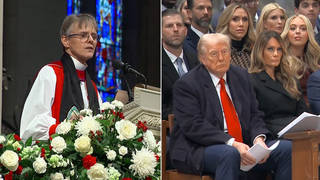
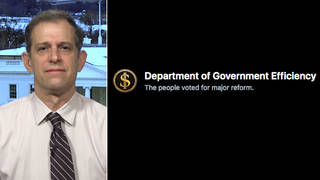
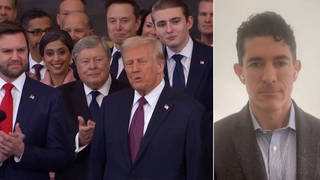
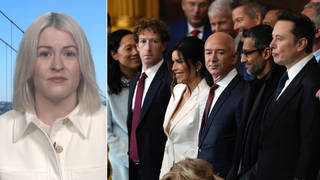





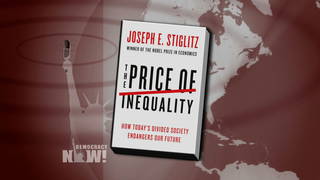
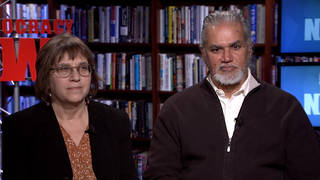
Media Options